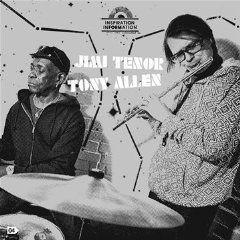Anyone who starts enthusing at you about their favourite drummer is, obviously, going to be talking to themselves before their minute’s up. But, uniquely, when that drummer is Tony Allen you’d do well to stick around. He’s such a one-off that standard praise evaporates on contact. Innovator? Plenty of those about, often bettered by the people who ripped them off. Living legend? All touring on the regular these days. Funky? Everything from brightly painted flats to quirky key-rings has drained the term of meaning. Influential? Well, he birthed a genre but you won’t hear another band that sounds like one of his.
And the simple reason for that is, no one else can do what Tony Allen does. Aged 69, he’s still the only person who can play the Afrobeat he invented during his time driving Fela Kuti’s band, Africa 70. It’s a total rhythm that allows no escape; you will dance. Imagine the peak point last time you were abandoned to music on the dancefloor, multiply it by four and hold it for two hours; that’s what Allen does for a living. This rhythm instantly takes over every part of your body, from head to viscera to toes, and never lets go. It’s a viral rhythm, infecting everyone in the room before they’re even aware. It’s an octopus rhythm that does what four drummers could but never would; you can almost feel its tentacles prodding all your pressure points at once. To get historical: Afrobeat took the freedom of jazz and the pared-down propulsion of James Brown as starting points way back when, and came up with something so ultra-modern it still sounds alien to most ears in the Anglosphere.
And the good news is, you can hear it out in full force here. There’s always a danger that these cross-generation collaborations will devolve into muso slop: nods to the greats from less savvy younger musicians who want to, say, colour in every gap with electronics, or — worse — saggy Jools Holland-style hoedowns you rilly had to be there to appreciate. So it’s a joy to find a partnership that brings the best out of both parties. Jimi Tenor, the misfit Finnish electronica funkateer whose kitsch persona has often obscured his multi-faceted musical chops, proves a sympathetic partner. Tenor plays it straight, supplying strong, classic soul and funk-inflected songs that segue naturally into the kind of dancefloor jams you want from Allen. It all works a treat, whether he’s wringing out white soul falsetto vocals or blowing a meaner jazz flute than Ron Burgundy.
Perhaps it’s due to the three years he’s spent playing with the Afrobeat band Kabu Kabu, perhaps its just his instincts for musical freedom and — crucially — restraint, but Tenor has succeeded where everyone from Ginger Baker to Damon Albarn hasn’t quite: in creating living, breathing music that uses Allen’s singular talent to its fullest. (Drafting Allen in to The Good The Bad And The Queen was the equivalent of getting Michelangelo in to paint your skirting boards; he did a good job, but talk about under-employment). The Allen Afrobeat makes virulent mutations of funk (‘Darker Side Of Night’), reggae (‘The Selfish Gene’) and dancefloor jazz (‘Three Continents’), not to mention something close to the urgent fourth world music created by Byrne and Eno on My Life In The Bush Of Ghosts (‘Path to Wisdom’). The two monster Afrobeat numbers here — ‘Got My Egusi’ and ‘Against The Wall’ — push the beats more to the fore than they were in Fela’s big band, and are staggering. The band broadens out on ‘Sinhue’; keeps it in the pocket on ‘Cella’s Walk’; hits a protean groove on ‘Mama England’. In short, this is the shit.
Anyone lucky enough to have caught his band live in recent years will know that Tony Allen has only consolidated his musical power with age. The sexagenarian in an ‘I ♥ Party’ T-shirt is — unlike many American funk legends, say — still capable of making a room of non-afficionados dance for two and a half hours. Fela fans might reasonably be thinking, “I’ve still got another 70 albums to hear before I even think about the solo offshoots”; funk fans might be wary in case this style borne of late 60s/early 70s Lagos might not have legs today. But they’d both be missing out. This is the Allen album every newcomer or beat lover would want to dig out of a crate. It’s that good.


